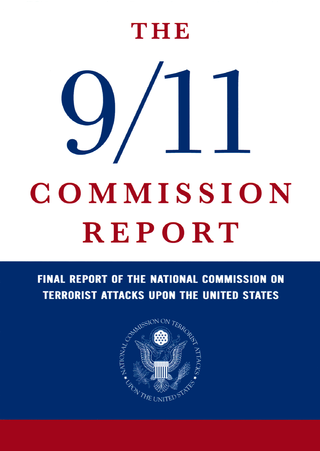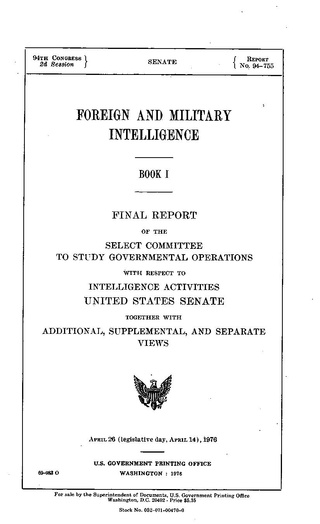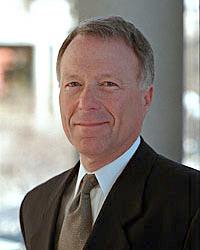
The Iran–Contra affair, often referred to as the Iran–Contra scandal, the McFarlane affair, or simply Iran–Contra, was a political scandal in the United States that occurred during the second term of the Reagan administration. Between 1981 and 1986, senior administration officials secretly facilitated the sale of arms to Iran, which was the subject of an arms embargo. The administration hoped to use the proceeds of the arms sale to fund the Contras, a right-wing rebel group, in Nicaragua. Under the Boland Amendment, further funding of the Contras by the government had been prohibited by Congress.

George John Tenet is an American intelligence official and academic who served as the Director of Central Intelligence (DCI) for the United States Central Intelligence Agency, as well as a Distinguished Professor in the Practice of Diplomacy at Georgetown University.
Executive privilege is the right of the president of the United States and other members of the executive branch to maintain confidential communications under certain circumstances within the executive branch and to resist some subpoenas and other oversight by the legislative and judicial branches of government in pursuit of particular information or personnel relating to those confidential communications. The right comes into effect when revealing the information would impair governmental functions. Neither executive privilege nor the oversight power of Congress is explicitly mentioned in the United States Constitution. However, the Supreme Court of the United States has ruled that executive privilege and congressional oversight each are a consequence of the doctrine of the separation of powers, derived from the supremacy of each branch in its area of constitutional activity.

The National Commission on Terrorist Attacks Upon the United States, also known as the 9/11 Commission, was set up on November 27, 2002, "to prepare a full and complete account of the circumstances surrounding the September 11 attacks", including preparedness for and the immediate response to the attacks. The commission was also mandated to provide recommendations designed to guard against future attacks.

Richard Alan Clarke is an American national security expert, novelist, and former government official. He served as the Counterterrorism Czar as the National Coordinator for Security, Infrastructure Protection, and Counter-Terrorism for the United States between 1998 and 2003.

The Vision for Space Exploration (VSE) was a plan for space exploration announced on January 14, 2004 by President George W. Bush. It was conceived as a response to the Space Shuttle Columbia disaster, the state of human spaceflight at NASA, and as a way to regain public enthusiasm for space exploration.

Richard Henry Carmona is an American physician, nurse, police officer, public health administrator, and politician. He was a vice admiral in the Public Health Service Commissioned Corps and served as the seventeenth Surgeon General of the United States. Appointed by President George W. Bush in 2002, Carmona left office at the end of July 2006 upon the expiration of his term. After leaving office, Carmona was highly critical of the Bush administration for suppressing scientific findings which conflicted with the administration's ideological agenda.

The 9/11 Commission Report is the official report into the events leading up to the September 11, 2001 terrorist attacks. It was prepared by the National Commission on Terrorist Attacks Upon the United States at the request of US President George W. Bush and Congress and is available to the public for sale or free download.

Alberto R. Gonzales is an American lawyer who served as the 80th United States Attorney General from 2005 to 2007 and is the highest-ranking Hispanic American in executive government to date. He previously served as Secretary of State of Texas, as a Texas Supreme Court Justice, and as White House Counsel, becoming the first Hispanic to hold that office.

The United States Commission on Ocean Policy was created by an act of the 106th United States Congress known as the Oceans Act of 2000. The commission's mandate was to establish findings and develop recommendations for a new and comprehensive national ocean policy. The final report was delivered in September 2004, and shortly afterwards the commission was terminated, as scheduled by the Oceans Act.

The Church Committee was a US Senate select committee in 1975 that investigated abuses by the Central Intelligence Agency (CIA), National Security Agency (NSA), Federal Bureau of Investigation (FBI), and the Internal Revenue Service (IRS). Chaired by Idaho Senator Frank Church (D-ID), the committee was part of a series of investigations into intelligence abuses in 1975, dubbed the "Year of Intelligence", including its House counterpart, the Pike Committee, and the presidential Rockefeller Commission. The committee's efforts led to the establishment of the permanent US Senate Select Committee on Intelligence.
The New Freedom Commission on Mental Health was established by U.S. President George W. Bush through Executive Order 13263 on April 29, 2002 to conduct a comprehensive study of the U.S. mental health service delivery system and make recommendations based on its findings. The commission has been touted as part of his commitment to eliminate inequality for Americans with disabilities.

Marion Clifton Blakey is an American businesswoman and former government official who served as president and CEO of Rolls-Royce North America. Prior to joining Rolls-Royce, she served as the eighth full-time chief executive of the Aerospace Industries Association, an American defense industry trade association from 2007 to 2015. Before this, she served a five-year term as the 15th Administrator of the Federal Aviation Administration. Blakey was the second woman to hold the position, serving as a successor to Jane Garvey, the first woman to hold the Administrator title. She was the second Administrator who was not a licensed pilot. She was awarded the Wright Brothers Memorial Trophy in 2013.

The President's Commission on Implementation of United States Space Exploration Policy was a Presidential Commission formed by United States President George W. Bush on January 27, 2004, through the Executive Order 13326. Its final report was submitted on June 4, 2004.

Irve Lewis "Scooter" Libby is an American lawyer and former chief of staff to Vice President Dick Cheney known for his high-profile indictment.

John Timothy Griffin is an American lawyer and politician serving as the 57th attorney general of Arkansas. He previously served as the 20th lieutenant governor of Arkansas, from 2015 to 2023. A member of the Republican Party, he previously was the United States Attorney for the Eastern District of Arkansas between 2006 and 2007 and U.S. Representative for Arkansas's 2nd congressional district from 2011 to 2015. Griffin defeated Democrat John Burkhalter for lieutenant governor in 2014 and served under Governor Asa Hutchinson. In summer 2020, Griffin announced his candidacy for the 2022 Arkansas gubernatorial election, but withdrew from the race in February 2021 to run for Arkansas Attorney General instead.

The National Surface Transportation Policy and Revenue Study Commission was a panel created by Section 1909 of SAFETEA-LU, signed into law by President George W. Bush on August 10, 2005. The commission was an attempt to study and develop a vision for the United States' surface transportation system. In laying out the parameters for the Commission, Section 1909 noted that “it is in the National interest to preserve and enhance the surface transportation system to meet the needs of the United States for the 21st century.”

According to the 2012 U.S. Global Leadership Report, 53% of Azerbaijanis approve of U.S. leadership, with 27% disapproving and 21% uncertain.

Frederick Whitten Peters is a District of Columbia lawyer and senior level public official. His law practice specializes in civil and criminal litigation including contract fraud, antitrust, tax and security cases. He has served in several key positions within the U.S. federal government, including as Secretary of the Air Force.

The White House Initiative on Educational Excellence for Hispanics is a multi-agency working group within the Department of Education charged with strengthening the nation's capacity to provide high-quality education while increasing opportunities for Hispanic American participation in federal education programs. In addition, the Initiative serves as a resource for information related to closing the educational achievement gap for Hispanic Americans. Finally, the Initiative provides staffing to support and coordinate the mission of a President's Advisory Commission on Educational Excellence for Hispanics.

















